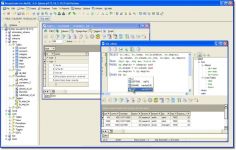 MySQL 5.6.21
MySQL 5.6.21
MySQL AB - ( Open Source)
MySQL is a successful open source database used in most web applications, e-commerce and online transaction processing.
MySQL is one of the world's most famous and used open source database. The software can be used to manage web applications, e-commerce and online transaction processing since MySQL database incorporates support those transactions. It is also commonly associated with PHP when it comes to managing websites.
With standard JDBC , ODBC, and Net, the developer can choose the programming language. MySQL has the advantage of working with almost all the popular operating systems and communicate easily with programming languages ​​such as C, C + +, VB, C #, PHP, Python, Ruby, Java, Perl, Eiffel, etc.MySQL replication allows you to create profitable applications. In addition, it enables the development of typologies replication complex and massive chain.Its reliability and robustness, performance, ease of use makes MySQL have more success than anticipated.
- Title:
- MySQL 5.6.21
- File Size:
- 44.8 MB
- Requirements:
- Windows 9x / 2000 / XP / Vista / Windows7 / Windows8
- Language:
- en-us
- License:
- Open Source
- Date Added:
- 24 Sep 2014
- Publisher:
- MySQL AB
- Homepage:
- http://www.mysql.com
- MD5 Checksum:
- 42DE6315091A7403AC85752F72145AF1
* Bugs Fixed
- InnoDB; Partitioning: Large numbers of partitioned InnoDB tables could consume much more memory when used in MySQL 5.6 or 5.7 than the memory used by the same tables used in previous releases of the MySQL Server.
- InnoDB: An ALTER TABLE ... ADD FOREIGN KEY operation could cause a serious error.
- InnoDB: In debug builds, an INSERT operation affecting compressed tables would raise a sync-related assertion.
- InnoDB: Retrieval of multiple values with a single get command would return incorrect results instead of an error message. The InnoDB memcached plugin does not currently support retrieval of multiple values with a single get command.
- InnoDB: Attempting to perform operations on a timed out key would cause the memcached daemon to crash and restart.
- InnoDB: With a transaction isolation level less than or equal to READ COMMITTED, gap locks were not taken when scanning a unique secondary index to check for duplicates. As a result, duplicate check logic failed allowing duplicate key values in the unique secondary index.
- InnoDB: In rare cases, the purge process would attempt to delete a secondary index record that was not marked for deletion, resulting in an inconsistent secondary index.
- InnoDB: During recovery, a segmentation fault would occur when marking a table as corrupt.
- InnoDB: A failed in-place ALTER TABLE operation would leave behind non-unique temporary file names in the data dictionary preventing future ALTER TABLE operations on the same table due to temporary file name conflicts. To avoid this problem, temporary file names are made unique by appending a static global number that is initialized to a random distributed 32-bit number using ut_time() and ut_crc32(). The number is then incremented atomically for each assigned temporary file name. Previously, temporary files were named using the format #sql-ibtid, where tid is the table ID. Temporary files are now named using the format #sql-ibtid-inc, where tid is the table ID and inc is the incremented number.
- InnoDB: srv_active_wake_master_thread() was called directly in innobase_commit and innobase_prepare, waking up the master thread and incrementing srv_activity_count. srv_active_wake_master_thread() should only be called after committing write transactions, not after read-only transactions or rollbacks. This patch also replaces some calls to srv_active_wake_master_thread() with calls to ib_wake_master_thread().
- InnoDB: An in-place ALTER TABLE operation on a table with a broken foreign key constraint could raise an assertion.
- InnoDB: Inserting a record into an InnoDB table with a key that falls between the maximum key of a full page and the minimum key of the next page could result in unnecessary page splits and under-filled pages. If the insert point is at the end of a page, InnoDB now attempts to insert to the next page before splitting the page.
- Replication: After the fix for Bug #16861624, killing a multi-threaded slave worker which was waiting for a commit lock caused a debug assertion to fail. This fix ensures that such a situation can not occur.
- Replication: When committing a transaction, a flag is now used to check whether a thread has been created, rather than checking the thread itself, which uses more resources, particularly when running the server with master_info_repository=TABLE.
- Replication: A multi-threaded slave now checks that a free worker is available to dispatch the next event. In previous versions, a multi-threaded slave crashes with a worker error if the thread coordinator can not find a free worker. The crash was caused when the coordinator did not return a free worker, for example if the coordinator was aborted at the same time using STOP SLAVE.
- Replication: When mysqlbinlog processed multiple binary log files into a single output file, this file was not in a useful state for point-in-time recovery, when it failed with the error, When @@SESSION.GTID_NEXT is set to a GTID, you must explicitly set it to a different value after a COMMIT or ROLLBACK. Please check GTID_NEXT variable manual page for detailed explanation. Current @@SESSION.GTID_NEXT is 'xyz'. When mysqlbinlog processes a binary log containing GTIDs, it outputs SET gtid_next statements, but gtid_next is set to undefined whenever a commit occurs; this left gtid_next undefined when the server had finished processing the output from mysqlbinlog. When the next binary log file started with one or more anonymous statements or transactions, the combination of gtid_next being left undefined at the end of the first binary log and the second binary log containing anonymous transactions to the error described previously (Error 1837, ER_GTID_NEXT_TYPE_UNDEFINED_GROUP).
- Replication: When the I/O thread reconnected to a master using GTIDs and multithreaded slaves while in the middle of a transaction, it failed to abort the transaction, leaving a partial transaction in the relay log, and then retrieving the same transaction again. This occurred when performing a rotation of the relay log. Now when reconnecting, the server checks before rotating the log in such cases, and waits first for any ongoing transaction to complete.
- Replication: When using semisynchronous replication, if the binary log position was changed to a future position on a slave then an assertion error was generated on the master. This fix ensures that in such a situation the future position is correctly acknowledged and an error is instead generated on the slave.
- Replication: When an SQL thread which was waiting for a commit lock was killed and restarted it caused a transaction to be skipped on slave. This fix ensures that thread positions are correctly persisted and transactions resume at the correct position.
- Replication: On a master that is using semisynchronous replication, where rpl_semi_sync_master_wait_no_slave is enabled and rpl_semi_sync_master_timeout is set to long timeout, killing the I/O thread could cause the server to hang on shutdown. This fix ensures that if the dump thread finds that there no semisynchronous slaves connected to the master, the setting of rpl_semi_sync_master_wait_no_slave is ignored and the shutdown proceeds correctly.
- Replication: When using row-based replication, setting a slave's slave_rows_search_algorithms variable to HASH_SCAN caused an ER_RECORD_NOT_FOUND error even though that record existed in the storage layer. This fix ensures that the unique key for each record is correctly maintained and such a situation does not occur.
- Replication: When an event group was spanned across multiple relay log files, a slave could incorrectly identify GTID-header group boundaries. This meant that when a transaction was retried, or if the SQL thread was stopped in the middle of a transaction after some rotates, the Gtid_log_event was being silently skipped on the slave, and the transaction was logged with the slave's GTID. This problem also impacted on using START SLAVE UNTIL MASTER_LOG_POS = log_pos; with GTIDs enabled. If log_pos was in the middle of a transaction, the Gtid_log_event was not correctly detected as the beginning of the transaction and replication stopped before this event. With this fix, threads correctly detect that they are part of a group, and this is used to check if a Gtid_log_event is part of a transaction.
- Replication: The error messages generated when a duplicate server UUID causes issues during replication have been improved. The slave error now identifies the duplicate server UUID and the master error identifies the zombie thread that has been killed.
- Replication: The CLIENT_REMEMBER_OPTIONS flag for compressed slave connections is no longer reset and all options are retained. This restores functionality of all options to compressed slave connections.
- Replication: When using row-based replication, running a long transaction involving a large number of events could trigger an Out of Memory (OOM) error if the slave's table structure was not compatible with the master's table structure. Such an incompatible situation could occur if the table on the slave had been manually changed, or when replicating between different MySQL versions that have different data types. This OOM error was caused because the virtual temporary tables created for the row conversion were not being freed until the end of the transaction, which was a problem when replicating large numbers of events.
- With DTrace support enabled, certain other compilation options could cause the build to fail.
- yaSSL client code did not validate the encryption size or session ID length, which could cause the client to exit.
- yaSSL could fail preauthorization if the client supplied inaccurate buffer lengths.
- Competition between threads could lead to timeout failure trying to rotate the audit log file.
- LPAD() and RPAD() could cause a server exit if the pad string argument was not well formed.
- The optimizer could create a zero-length column for a temporary table, causing a server exit.
- MOD for very small decimal right-hand arguments could cause a server exit.
- The client library now includes a call to X509_verify_cert_error_string() in the SSL certificate verification code, to be more robust in detecting invalid certificates.
- If the left-hand-side of an IN predicate was a scalar subquery but returned no row, the server could exit.
- The thread_concurrency system variable is deprecated, but no warning resulted from setting it at server startup.
- Sending a SIGQUIT or SIGINT signal to mysql could result in a glibc double free or corruption error.
- Invalid memory access could occur when using prepared statements if a mysql client connection was lost after statement preparation was complete and there was at least one statement that was in initialized state but not prepared yet.
- LIKE matches failed for code points of HALF WIDTH KATAKANA in the sjis and cp932 character sets.
- On EL7, installation of MySQL from RPM packages could fail if postfix had previously been installed using yum.
- mysql_upgrade could fail if the mysql.user table contained multiple accounts with the same user name and host name where the host name differed in lettercase. This is still not permitted, but now mysql_upgrade prints a more informative error message to indicate the nature of the problem:
> ERROR 1644 (45000): Multiple accounts exist for user_name, host_name
> that differ only in Host lettercase; remove all except one of them
- If the general query log or slow query log file was set to a FIFO or socket file, and the file reader went away, the server stopped executing statements. Now the server detects such files, logs an error message, and continues with the appropriate log disabled.
- A simultaneous OPTIMIZE TABLE and online ALTER TABLE on the same InnoDB table could result in deadlock.
- The query cache was not invalidated for a table when a CASCADE DELETE or CASCADE UPDATE referential constraint was specified and the database name or table name contained special characters.
Related software
2.1/5 from 178 users


